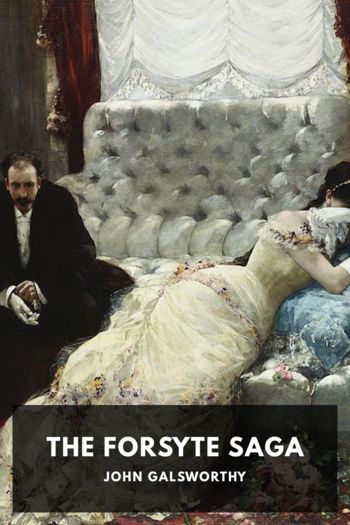The Forsyte Saga - John Galsworthy (best english novels for beginners .txt) 📗

- Author: John Galsworthy
Book online «The Forsyte Saga - John Galsworthy (best english novels for beginners .txt) 📗». Author John Galsworthy
“Yes,” Soames had answered, “I represent your landlord; in fact, I’m his son.”
“Won’t you sit down, sir, please? Tell Maman to come to this gentleman.”
He was pleased that the girl seemed impressed, because it showed business instinct; and suddenly he noticed that she was remarkably pretty—so remarkably pretty that his eyes found a difficulty in leaving her face. When she moved to put a chair for him, she swayed in a curious subtle way, as if she had been put together by someone with a special secret skill; and her face and neck, which was a little bared, looked as fresh as if they had been sprayed with dew. Probably at this moment Soames decided that the lease had not been violated; though to himself and his father he based the decision on the efficiency of those illicit adaptations in the building, on the signs of prosperity, and the obvious business capacity of Madame Lamotte. He did not, however, neglect to leave certain matters to future consideration, which had necessitated further visits, so that the little back room had become quite accustomed to his spare, not unsolid, but unobtrusive figure, and his pale, chinny face with clipped moustache and dark hair not yet grizzling at the sides.
“Un Monsieur très distingué,” Madame Lamotte found him; and presently, “Très amical, très gentil,” watching his eyes upon her daughter.
She was one of those generously built, fine-faced, dark-haired Frenchwomen, whose every action and tone of voice inspire perfect confidence in the thoroughness of their domestic tastes, their knowledge of cooking, and the careful increase of their bank balances.
After those visits to the Restaurant Bretagne began, other visits ceased—without, indeed, any definite decision, for Soames, like all Forsytes, and the great majority of their countrymen, was a born empiricist. But it was this change in his mode of life which had gradually made him so definitely conscious that he desired to alter his condition from that of the unmarried married man to that of the married man remarried.
Turning into Malta Street on this evening of early October, 1899, he bought a paper to see if there were any after-development of the Dreyfus case—a question which he had always found useful in making closer acquaintanceship with Madame Lamotte and her daughter, who were Catholic and anti-Dreyfusard.
Scanning those columns, Soames found nothing French, but noticed a general fall on the Stock Exchange and an ominous leader about the Transvaal. He entered, thinking: “War’s a certainty. I shall sell my consols.” Not that he had many, personally, the rate of interest was too wretched; but he should advise his Companies—consols would assuredly go down. A look, as he passed the doorways of the restaurant, assured him that business was good as ever, and this, which in April would have pleased him, now gave him a certain uneasiness. If the steps which he had to take ended in his marrying Annette, he would rather see her mother safely back in France, a move to which the prosperity of the Restaurant Bretagne might become an obstacle. He would have to buy them out, of course, for French people only came to England to make money; and it would mean a higher price. And then that peculiar sweet sensation at the back of his throat, and a slight thumping about the heart, which he always experienced at the door of the little room, prevented his thinking how much it would cost.
Going in, he was conscious of an abundant black skirt vanishing through the door into the restaurant, and of Annette with her hands up to her hair. It was the attitude in which of all others he admired her—so beautifully straight and rounded and supple. And he said:
“I just came in to talk to your mother about pulling down that partition. No, don’t call her.”
“Monsieur will have supper with us? It will be ready in ten minutes.” Soames, who still held her hand, was overcome by an impulse which surprised him.
“You look so pretty tonight,” he said, “so very pretty. Do you know how pretty you look, Annette?”
Annette withdrew her hand, and blushed. “Monsieur is very good.”
“Not a bit good,” said Soames, and sat down gloomily.
Annette made a little expressive gesture with her hands; a smile was crinkling her red lips untouched by salve.
And, looking at those lips, Soames said:
“Are you happy over here, or do you want to go back to France?”
“Oh, I like London. Paris, of course. But London is better than Orleans, and the English country is so beautiful. I have been to Richmond last Sunday.”
Soames went through a moment of calculating struggle. Mapledurham! Dared he? After





Comments (0)